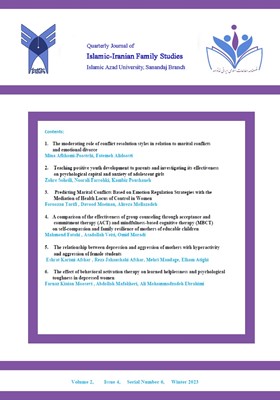Predicting marital conflicts based on emotion regulation strategies with the mediation of health locus of control in women
Subject Areas : Islamic-Iranian Family Studies JournalForoozan Tarifi 1 , Davood Moeinan 2 * , Alireza Mollazadeh 3
1 - M.A. Student in Clinical psychology, Faculty of Humanities, Ashtian Branch, Islamic Azad University, Ashtian, Iran
2 - Instructor of psychology, Faculty of Humanities, Islamic Azad University, Ashtian Branch, Ashtian, Iran
3 - Assistant Professor in Psychology, Ashtian Branch, Islamic Azad University, Ashtian, Iran
Keywords: Women, Locus of Control, emotion regulation, Marital conflict,
Abstract :
Aim: The aim of the present study was to predict marital conflicts based on emotion regulation strategies with the mediation of health locus of control in women. Method: The research method was descriptive-correlation of structural equations type. The statistical population of the research included all women with marital conflict who referred to Islamic counseling center in Dezful city in 2019-2020. Using the available sampling method, 200 women with marital conflict were selected. Research tools included Garnefski et al.'s emotion regulation questionnaire (2002), Walston et al.'s health locus of control scale (1978), and Sanai and Barati's marital conflicts questionnaire (1996). Data were analyzed using Pearson correlation and path analysis. Results: The research findings indicated the direct effect of external control source and internal control source on marital conflicts in women, the direct effect of efficient and ineffective emotion regulation on marital conflicts in women, and the indirect effect of emotion regulation through the mediating variable of health control source. Also, the fit of the research model was favorable and confirmed (p≥001). Conclusions: Therefore, it can be concluded that effective emotion regulation strategies and internal health control resources reduce marital conflicts in people.
_||_

